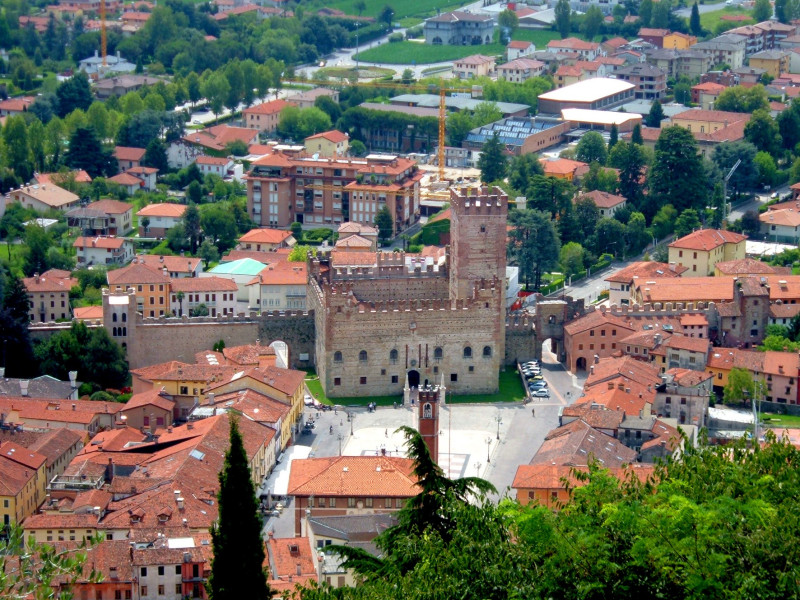Marostica
Marostica (Venetian language: Maròstega), is a town and comune in the province of Vicenza, Veneto, northern Italy. It is mostly famous for its living chess event and for the local cherry variety. History The name of the city can be traced back to the Venetic (Adriatic Veneti) language and recalls the hills (mar/maros) and the several streams of water (rost) coming down from the adjacent mountains and the verb "to have" in Venetic language (ga). Hence the name means "that has mountains and hills". Several Venetic findings have been discovered, dating back to the first millennium B.C. When the Adriatic Veneti federated with the Romans, they slowly abandoned their language; the modern Venetian language descends from Latin and is not related to Venetic. Between the 11th and 13th centuries, the locality was greatly influenced by several members of the important medieval family from the Veneto, known as the Ezzelini it:Ezzelini. They were finally defeated in 1260. Marostica was a Venetian city until Venice jointed Italy. During the 19th century it was mainly a relatively poor town; a great number of inhabitants went to look for fortune in Brasil and many other places in the world. The wealth of the town grew greatly after the second world war. Marostica is famous all over the world for the human chess game it carries out every other year, with living chess pieces, in the city public square. Culture Every even year, in September, a game of chess using live pieces is played. After the First World War, members of the local chess club began playing chess in the main square and decided to play a game of chess using people as the gamepieces. After the Second World War, the comedy writer Mario Mirko Vucetich authored a play in which "Two noblemen, Rinaldo D'Anganaro and Vieri da Vallanora, fell in love with the beautiful Lionora, daughter of the local lord, Taddeo Parisio. As was the custom at that time, they challenged each other to a duel to win the hand of Lionora. The Lord of Marostica, not wanting to make an enemy of either suitor or lose them in a duel, forbade the encounter. Instead he decreed that the two rivals would play a chess game, and the winner would have the hand of Lionora. The loser of the chess game would also join the family, through marrying her younger sister, Oldrada. During the play the game takes place on the square in front of the Lower Castle with supporters carrying the noble ensigns of Whites and Blacks, in the presence of the Lord, his noble daughter, the Lords of Angarano and Vallonara, the court and the entire town population. The Lord also decides the challenge would be honoured by an exhibition of armed men, foot-soldiers and knights, with fireworks and dances and music". Needless to say, this literary account has nothing to do with factual history and the chess square in the city was built after the Second World War and after the writing of Vucetich's play. This fictional story is now re-enacted in the main square of Marostica every second Friday, Saturday and Sunday of September of even-numbered years. The orders are still given to the cast today in the local Language (Venetian) of the "Most Serene Republic of Venice". International relations Twin towns – Sister cities Marostica is twinned with: São Bernardo do Campo, Brazil Tendō, Japan Mignano Monte Lungo, Italy Montigny-le-Bretonneux, France Famous people from Marostica Giovanni Battaglin, cyclist, Giro d'Italia and Vuelta a España winner Tatiana Guderzo, cyclist, Italian and World Champion Enrico Battaglin, cyclist

